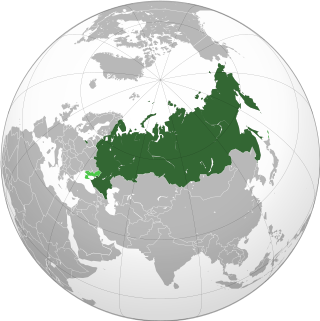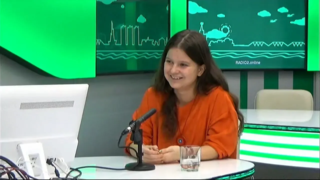List of LGBT books banned in Russia is the list of books whose distribution is restricted in Russian bookstores due to the Russian gay propaganda law. [1] [2] The formal name of the list is "Register of goods containing banned information (LGBT+)". [3]
Among the more than 250 titles are works by Plato, Boccaccio, Virginia Woolf, Fyodor Dostoevsky, Stephen King, Haruki Murakami, Marcel Proust, Oscar Wilde, and Stefan Zweig. The publication of the list caused a wide public outcry. [4]
Manifestations of LGBT book censorship have happened before, [5] but the existence of the list became known on February 20, 2024, although it was compiled as early as December 2022. Representatives of the authorities, including deputy Alexander Khinshtein, tried to disavow the list, despite the fact that various representatives of the book market confirmed its existence. [6] [7] [8] Another MP, Aleksandr Sholokhov, expressed support for the list. [9]

Lesbian, gay, bisexual, and transgender (LGBT) people in the Russian Federation face significant challenges not experienced by non-LGBT residents. Although sexual activity between consenting adults of the same sex is legal, homosexuality is disapproved of by most of the population and pro-LGBT advocacy groups are deemed extremist and banned. It is illegal for individuals to "promote homosexuality" and same-sex couples and households headed by same-sex couples are ineligible for the legal protections available to opposite-sex couples. Russia provides no anti-discrimination protections for LGBT people and does not have a designation for hate crimes based on sexual orientation and gender identity. Transgender people are not allowed to change their legal gender and all gender-affirming care is banned. There are currently no laws prohibiting discrimination based on gender identity or expression, and recent laws could be used to discriminate against transgender residents.

Central Airport is an airport in Omsk Oblast, Russia, located 5 km southwest of Omsk. It is capable of handling wide-bodied aircraft. 975,000 passengers passed through the airport in 2013.

Makhachkala Uytash Airport is a civil airport located near Makhachkala and Kaspiysk cities. It is named after Amet-khan Sultan, World War II fighter pilot, twice Hero of the Soviet Union. The naming was found controversial by the Crimean Tatars, with whom Amet-khan openly affiliated, as an attempt to detatarize his origins.

The Federal Service for Supervision of Communications, Information Technology and Mass Media, abbreviated as Roskomnadzor (RKN), is the Russian federal executive agency responsible for monitoring, controlling and censoring Russian mass media. Its areas of responsibility include electronic media, mass communications, information technology and telecommunications, supervising compliance with the law, protecting the confidentiality of personal data being processed, and organizing the work of the radio-frequency service.
Russia does not recognize same-sex marriage or civil unions for same-sex couples. Since 2020, the Russian Constitution has explicitly outlawed same-sex marriage. Statutory Russian laws also contain provisions forbidding same-sex marriages.
The Russian LGBT Network is a non-governmental LGBT rights organization working for the social acceptance of and protection of the rights of LGBT people in Russia. Founded in 2006, it was reformed into the first Russian inter-regional LGBT rights organization on October 19, 2008. The organization is a member of the International Lesbian and Gay Association (ILGA) and is led by Russian LGBT rights activist Igor Kochetkov.
The Belarusian LGBT Human Rights Project GayBelarus is a national youth civic association. They operate the Jáhada positive queer infoportal.

The history of lesbian, gay, bisexual and transgender people (LGBT) in Russia and its historical antecedents has largely been influenced by the political leanings of its rulers. Medieval Catholic-Protestant Europe had the largest influence on Russian attitude towards homosexuality. Russian LGBT history was influenced by the ambivalent attitude of the Russian Orthodox religiosity regarding sexuality.
In the Russian Empire, government agencies exerted varying levels of control over the content and dissemination of books, periodicals, music, theatrical productions, works of art, and motion pictures. The agency in charge of censorship in the Russian Empire changed over time. In the early eighteenth century, the Russian emperor had direct control, but by the end of the eighteenth century, censorship was delegated to the Synod, the Senate, and the Academy of Sciences. Beginning in the nineteenth century, it fell under the charge of the Ministry of Education and finally the Ministry of Internal Affairs.

In Russia, internet censorship is enforced on the basis of several laws and through several mechanisms. Since 2012, Russia maintains a centralized internet blacklist maintained by the Federal Service for Supervision of Communications, Information Technology and Mass Media (Roskomnadzor).

Yelena Borisovna Mizulina is a Russian politician and lawyer. She served as a member of the State Duma between 1995 and 2003 and again between 2007 and 2015, and has been a member of the Federation Council since 2015.
Ultra.Kultura was a Russian counterculture book publisher.

The free online encyclopedia Wikipedia was briefly blocked in Russia in August 2015. Some articles of Wikipedia were included into various censorship lists disseminated by the government. Further threats to block were made following the 2022 Russian invasion of Ukraine.

Yulia Vladimirovna Tsvetkova is a Russian artist and activist from Komsomolsk-on-Amur. She is the organizer of the activist art festival Saffron Flower and the founder of the “Woman--not doll” project which destigmatizes the female body. She is also the director of the “Merak” youth theater. On February 11, 2020, she was recognized as a political prisoner.
2022 in Russia is the 31st year of the Russian Federation.

Left Socialist Action or Left Social Democrats is a social democratic and democratic socialist political organization in Russia founded in August 2007.
A Summer in the Red Scarf is a coming-of-age book series co-written by a Ukrainian-Russian duo Katerina Silvanova and Elena Malisova. The series has gained significant attention for its compelling narrative and its portrayal of LGBTQ+ themes within the context of the Soviet Union. The books have experienced both critical acclaim and controversy since their publication by independent publisher Popcorn Books.